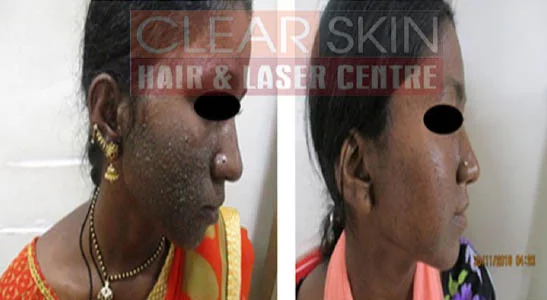Eczema is a common skin condition that causes the skin to become inflamed, itchy, red, cracked, or rough, and sometimes blisters can occur. It can appear on any part of the body and often called Dermatitis. It usually affects people with dry and sensitive skin.
Acute eczema is a sudden appearance of red, inflamed skin lesions with the possibility of blisters formation can occur.
Sub acute eczema is the transitional phase between the acute and chronic stages. It appears as scaly skin, flaky, or cracks in the skin. In some, it can also begin as sub acute eczema.
Chronic eczema is a process of long-standing eczema; the skin is scaly and thickened.
Atopic eczema: It is the most chronic (long-lasting) and severe kind of eczema.It happens due to genetic, environmental factors, or immune disorder; which leads to hypersensitivity allergy or itching. It is the most chronic (long-lasting) and severe kind of eczema.It happens due to genetic, environmental factors, or immune disorder; which leads to hypersensitivity allergy or itching
Discoid or nummular eczema: It is a common type of eczema that can occur at any age and appears as discrete skin allergy on a background of normal skin.
Allergic contact eczema: It happens due to contact with a foreign substance, poison ivy which is identified by the immune system.
Irritant contact eczema: This happens due to contact with skin irritants, such as acids and other chemicals.
Dyshidrotic eczema: This is a minute blistering type of eczema, limited to the hands and feet, where it sweats more. It is common in women.
Neurodermatitis: It is a localized skin condition characterized by chronic itching or scaling with a raised, rough skin over the neck, wrists, forearms, legs, or anal region.
Seborrheic eczema: It appears as oily, yellowish, and scaly patches and occurs on the body where there are a lot of oil-producing (sebaceous) glands like the scalp, face, upper chest and back.
Stasis dermatitis: It occurs due to problems with the veins, generally in the lower legs due to problems with venous blood circulation process.
Hand eczema: This form of eczema affecting up to 10% of the population, and occurs due to genetics and contact allergens or irritating substances.
Infective Eczema: Any type of eczema getting infected with bacteria and appears as pus-filled lesions.
Genetic Inherited certain genetic defects can cause some people to have dry and extra sensitive skin. As it runs in family members who have eczema or who have a fever (allergic rhinitis) or asthma. Even it is thought that defects in the skin barrier contribute to eczema.
Immune disorders: An overactive immune system can cause a hypersensitive reaction to allergen leading to eczema.
Hormones: Hormones are chemicals produced by the body. They can cause a wide variety of effects. When the levels of certain hormones in the body increase or decrease some women can experience flare-ups of their eczema.
Stress: Stress is known to be associated with eczema but it is not fully understood how it affects the condition. Some people with eczema the symptoms get worse when they are stressed and some feel stress due to eczema.
Foods: Atopic eczema can sometimes be caused by food allergens, especially before the age of one. Some studies of children and young people with atopic eczema found that one-third to nearly two-thirds also had a food allergy. Food allergies associated with eczema causes are typical; dairy products, eggs, nuts and seeds, soy products or wheat
IRRITANTS: Irritants can make your symptoms worse. What irritates you may be different from what irritates someone else with the condition, but could include; soaps, detergents, shampoos, dish-washing liquids, bubble bath, and disinfectants like chlorine or contact with juices from fresh fruits, meats, vegetable.
ALLERGENS: : If your genes make you more likely to develop atopic eczema, the condition will develop after you are exposed to certain environmental factors such as allergens. Allergens are substances that can cause the body to react abnormally. This is known as an allergic reaction. Some of the most common allergens that can be causes of eczema include; house dust mites, pets (cats &dogs), smoke and pollens (seasonal), perfumes, molds, or dandruff.
MICROBES: Some types of microbe can be triggers of eczema such as certain bacteria (Staphylococcus aureus), viruses, or fungi.
HOT or COLD TEMPERATURES: Extreme hot and cold weather, high and low humidity or perspiration from exercise can aggravate eczema.
There is no exact medicine to cure eczema. It may require treatment on and off as it tends to recur. Hence you need to know the triggering factors and keep them under control. The key component in controlling eczema is good skincare (regular bathing), modifying the skincare (moisturizing) routine, and change in few lifestyles such as to food; stress, etc. will help in controlling mild eczema.
The severe or recurrent eczema may need to take medications to control their symptoms. The following treatment used for eczema such as:
There are plenty of over-the-counter products available, which work to some extent in eczema. As some work by moisturizing the skin, some help to reduce the symptoms like itch or rash, and others work by gently cleaning the skin to prevent secondary infection.
Moisturizers play an important role in controlling eczema, as most of the time the affected skin is dry which can flare the rash. However extreme weather conditions cold, hot temperature or humidity and repeated washing or use of stringent soap can cause dry and sensitive skin.
These have anti-inflammatory actions and work to relieve skin inflammation and itchiness. As these can cause severe damage on over-use such as skin thinning and skin tear. Hence these creams are to be strictly used with dermatologist prescriptions.
are used in milder form or long-standing cases of atopic eczema. These work by the immune-modulating effect.
Antihistamines work by blocking the action of histamine that causes itching. There are different antihistamines available in the market which even has a sedative effect. Sedative medicine is also prescribed in severe eczema with sleep disturbances.
These systemic corticosteroids are prescribed when topical treatment does not work or when there is a severe exacerbation of eczema involving the extensive parts of the skin. The oral corticosteroids are to be prescribed by experts in a skin professional as these have serious side effects and hence are given for a short time.
As in eczema, the immune system is over-active, producing the abrupt skin inflammation leading to itching, redness, or oozing and blister formation. Immunosuppressant drugs help by controlling the immune system. In severe eczema, the dermatologist prescribes a steroid-sparing immunosuppressant to control the symptoms. They may have an increased risk of cancer, to be used with caution.
Intense and long-term itching may damage the skin barrier and permit the bacteria to enter the skin causing infections. Therefore, In infected eczema, the antibiotics are given to control the infections.
Recently FDA has approved a new, injectable biologic called dupilumab to treat severe atopic eczema which does not respond to other treatment options. These biologic drugs contain genetically engineered proteins to target the specific parts of the immune system that triggers eczema.
This is the simplest form of light therapy (phototherapy) that involves exposing the skin to natural sunlight or artificial ultraviolet A (UVA) and narrowband ultraviolet B (UVB) either alone or with medications. It works by reducing the itching and inflammation of the skin. However it is an effective treatment, but long-term light therapy has harmful effects, including premature skin aging and an increased risk of skin cancer.
It’s an effective, intensive treatment for severe atopic eczema. It involves the wrapping of the affected area with topical corticosteroids and wet bandages. This is mostly done in hospitals for people with widespread lesions.
| DO | DON'T |
|---|---|
| Use mild soap | Do not use harsh soap |
| Gently wash | Do not over-wash or repeatedly wash |
| Use regularly moisturizers | Don't use perfume or scented products |
| Drink adequate water & keep hydrated | Do not take very hot or very long shower baths. |
| Do reduce stress | Do not over scratch the affected area |
| Use paraben-free products | Do not expose to smoke or pollen |
| Use any product after checking the ingredients | Do not eat dairy products or food like eggs, nuts and seeds, soy products or wheat |
| Do not isolate yourself |

